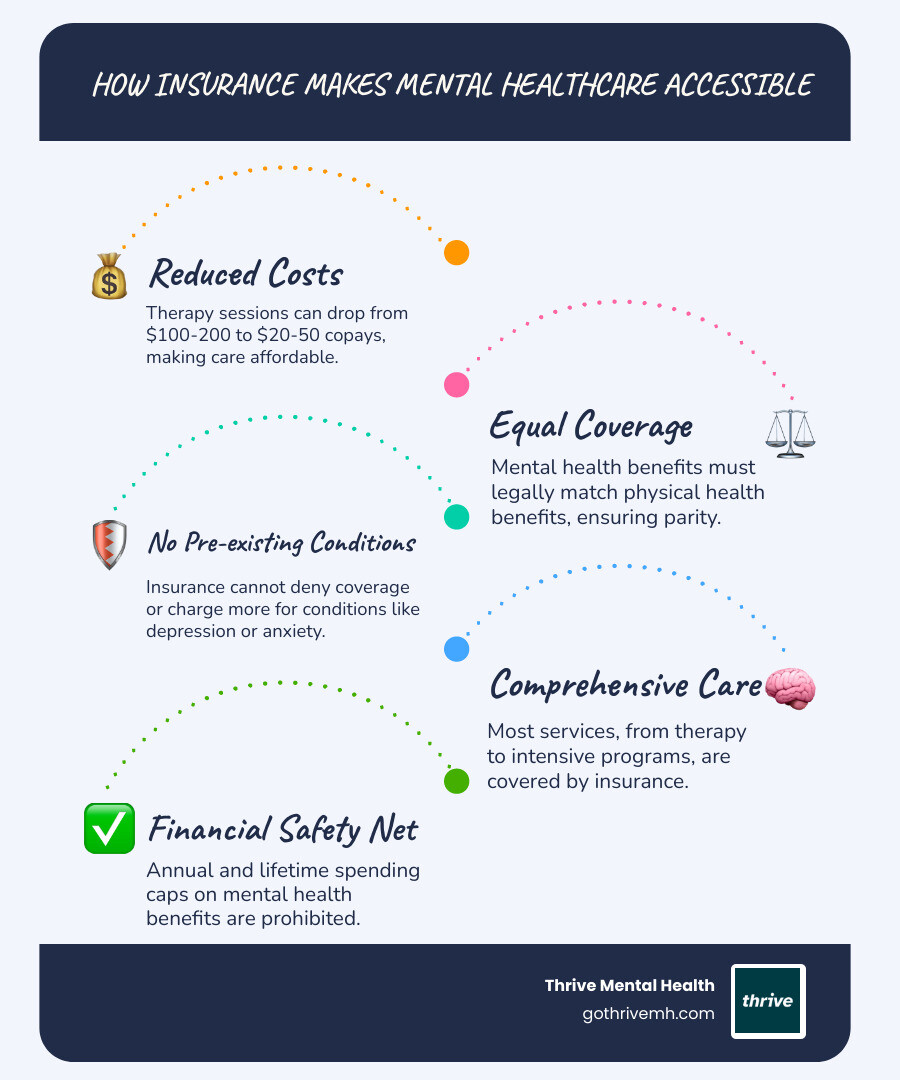Mental Health Coverage Made Simple (and Why Your Insurance Should Have It)

Why Mental Health Coverage Matters More Than Ever
The benefits of health insurance covering mental health services are transformative, making care accessible to millions. Here’s what you need to know:
Key Benefits:
- Reduced costs: Therapy sessions drop from $100-200 to $20-50 copays
- Equal treatment: Mental health coverage must match physical health benefits
- No pre-existing condition barriers: Depression and anxiety can’t be used to deny coverage
- Comprehensive care: From therapy to intensive programs, most services are covered
- Financial protection: Annual and lifetime spending caps are prohibited
For too long, insurance companies treated psychological care as a luxury. But mental health is health. Before recent reforms, cost was the primary barrier for 72% of adults with mental illness seeking treatment.
Today, federal laws mandate parity: if your plan covers a broken arm, it must also cover depression. This has profoundly impacted access, with the number of people avoiding care due to cost dropping by one-third.
Navigating insurance can still be overwhelming. This guide will break down how to maximize your mental health benefits, from covered services to finding a provider and handling denials.
As Nate Raine, CEO of Thrive Mental Health, I’ve seen how proper insurance coverage transforms lives by removing financial barriers to essential care. For over a decade, I’ve helped thousands of patients access the benefits of health insurance covering mental health services.

Quick benefits of health insurance covering mental health services terms:
The Legal Foundation: How Parity Laws Guarantee Equal Coverage

Knowing your rights is key to understanding the benefits of health insurance covering mental health services. For decades, insurers treated mental health care as less important than physical health, but that’s no longer legal. Federal laws now require most plans to treat mental and physical health equally. If your plan covers diabetes medication, it must also cover anxiety therapy. This is the law.
What are mental health parity laws?
The 2008 Mental Health Parity and Addiction Equity Act (MHPAEA) was a game-changer. This federal law prevents insurers from favoring physical health over mental health and substance use disorder treatment. In practice, this means financial requirements like copays and deductibles must be the same. If your copay for a family doctor is $20, it should be the same for a therapist.
Arbitrary treatment limitations, like capping therapy sessions at 12 per year, are now largely prohibited unless similar limits exist for medical care. The law also covers non-quantitative treatment limitations (NQTLs)—the administrative problems like prior authorization or medical necessity reviews. These cannot be more restrictive for mental health than for physical health.
The Affordable Care Act (ACA) of 2010 further strengthened these protections. It made mental health an Essential Health Benefit for most plans, eliminated pre-existing condition exclusions for issues like depression or anxiety, and banned lifetime limits on care.
For the full details on what federal law requires, check out what the law says about mental health coverage.
Which plans must follow these laws?
These protections cover most Americans, including employer-sponsored plans (for companies with >50 employees) and ACA Marketplace plans, which automatically include mental health as an essential benefit. Medicaid and the Children’s Health Insurance Program (CHIP) are also required to provide equal mental health coverage.
Some states, including Florida, have additional protections. If you’re navigating Florida insurance options, our comprehensive guide to Aetna, Florida Blue, and Evernorth plans can help you understand your specific coverage.
These laws provide a strong foundation for accessing affordable, quality care. The real benefits of health insurance covering mental health services come when you use these protections effectively.
The Financial Benefits of Health Insurance Covering Mental Health Services

Mental health care can be expensive, with therapy sessions costing $100-$200 without insurance. This is where the benefits of health insurance covering mental health services are life-changing, making care an accessible necessity rather than a luxury. Insurance makes mental health care affordable and predictable, removing the financial fear that often prevents people from seeking help. It also provides access to a wider network of providers and a crucial financial safety net, protecting you from devastating bills in a crisis.
How insurance lowers the direct cost of care
The cost difference with and without insurance is dramatic:
| Service Type | Without Insurance (Avg. Cost per Session) | With Insurance (Typical Copay) |
|---|---|---|
| Therapy Session | $100 – $200 | $15 – $45 |
| Psychiatric Visit | $100 – $400 | $20 – $60 |
Your plan uses several tools to manage costs. Deductibles are what you pay before insurance starts covering costs. Thanks to parity laws, mental health expenses count toward the same deductible as your physical health costs. Copayments are fixed fees (e.g., $25) you pay per session, making costs predictable. With coinsurance, you pay a percentage of the cost (e.g., 20%), and your insurer pays the rest.
Perhaps most importantly, the out-of-pocket maximum is your ultimate financial safety net. It’s the most you’ll pay for covered services in a year. After you reach it, your insurance pays 100%, which is invaluable for those needing intensive treatment. Statistics show the ACA has reduced costs for mental health care, allowing more people to access care.
The long-term economic benefits of health insurance covering mental health services
The benefits extend beyond immediate savings. Consistent mental health care positively impacts every area of your life.
- Improved work productivity: Treatment for conditions like depression and anxiety often restores concentration and energy, brightening career prospects.
- Reduced disability claims: Early and consistent treatment can prevent mental health conditions from becoming debilitating.
- Lower overall healthcare spending: Untreated mental health issues can worsen physical problems like heart disease. Proactive care prevents these costly complications.
- Prevention of costly crisis care: Regular outpatient therapy is far less expensive than emergency room visits or psychiatric hospitalizations. Consistent care makes reaching a crisis point less likely.
At Thrive Mental Health, we help patients in Florida use their insurance benefits for comprehensive care like IOP and PHP programs, making intensive treatment accessible when it’s needed most.
Understanding one of the key benefits of health insurance covering mental health services: pre-existing condition protection
Worried that a past diagnosis of depression or anxiety could prevent you from getting insurance? Those days are over. Thanks to the ACA, insurers cannot deny you coverage for pre-existing conditions like depression, bipolar disorder, or PTSD. They must offer you the same plans as everyone else.
They also cannot charge you higher premiums due to your mental health history. This ensures that those who need coverage most can afford it. There are also no lifetime limits or waiting periods for pre-existing conditions, so you can use your benefits from day one. This protection is vital, as conditions like anxiety and depression affect millions. Knowing you can get affordable coverage provides peace of mind and removes a major barrier to care.
What’s Covered? A Look at Specific Mental Health Services

One of the key benefits of health insurance covering mental health services is how comprehensive coverage has become. Thanks to parity laws and the ACA, plans now cover a wide range of services beyond a few therapy sessions. Coverage typically spans from crisis intervention to ongoing support.
- Inpatient services offer 24/7 care in a hospital setting for crises.
- Outpatient services allow you to receive care—like therapy or intensive programs—while maintaining your daily routine.
- Psychotherapy and counseling (“talk therapy”) form the backbone of treatment, helping you develop coping strategies.
- Medication management provides regular check-ins with a prescriber to monitor psychiatric medications.
- Substance use disorder treatment is also covered, from detox to long-term support, recognizing the link between mental health and addiction.
Common Outpatient and Inpatient Programs
Comprehensive coverage meets you where you are. Individual therapy offers one-on-one time with a therapist, while group therapy provides community and mutual support. Family therapy addresses how a mental health condition impacts the entire family, helping improve communication. Psychiatric evaluations are a common starting point, providing a comprehensive assessment to determine the best, customized treatment approach.
For more intensive support, Virtual Intensive Outpatient (IOP) Programs offer structured treatment for several hours a day, multiple days a week, without an overnight stay. They are ideal when weekly therapy isn’t enough but 24/7 supervision isn’t needed. At Thrive Mental Health, our virtual IOP Programs are accessible from anywhere in Florida, fitting into your life with expert care.
Partial Hospitalization Programs (PHP) offer a higher level of care, with a full day of structured therapy. PHP bridges the gap between inpatient and outpatient care, often helping to transition from a hospital stay or avoid one entirely.
Specialized Therapies and Support
Modern coverage includes specialized, evidence-based therapies proven to work for specific conditions. Your insurance covers treatments that research shows are effective.
- Cognitive Behavioral Therapy (CBT) is widely covered for its effectiveness in changing negative thought patterns that fuel anxiety and depression.
- Dialectical Behavior Therapy (DBT) is for treating intense emotions and relationship difficulties by teaching skills in mindfulness, emotion regulation, distress tolerance, and interpersonal effectiveness. At Thrive Mental Health, we specialize in DBT and can help you maximize your insurance benefits for DBT.
A significant advance is the widespread coverage of telehealth and virtual visits. Now a permanent feature of mental health care, your insurance likely covers virtual therapy, psychiatric appointments, and even intensive programs. This offers the same quality treatment with greater convenience and accessibility. Telehealth is a game-changer for those with busy schedules or in remote areas. Our virtual programs at Thrive Mental Health harness these benefits to bring expert care directly to you in Florida.
Navigating Your Plan: Finding Care and Handling Denials

Understanding the benefits of health insurance covering mental health services is the first step. The next is learning to use them. Finding a provider, understanding terms like “prior authorization,” and handling claim denials can feel overwhelming, but you can steer it successfully. View your insurance plan as a roadmap, not a roadblock. The key is knowing the rules and what to do if you encounter a problem.
How to Find a Covered Mental Health Provider
Finding an in-network provider isn’t a treasure hunt if you know where to look. Start with your insurer’s provider directory, using their online tools to filter by specialty and location. In Florida, you can search for providers in Tampa Bay, Orlando, and other areas.
Your primary care physician is another great resource for referrals, as they often know local professionals who accept your plan. Crucially, always verify insurance acceptance directly with the provider’s office. Networks change, so online directories can be outdated. Give them your specific plan name and member ID.
Ask key questions on your first call: What is the copay? Do you handle billing? Do you have experience with my concerns? Do you offer telehealth options? At Thrive Mental Health, we make it easy for Florida residents to find a provider through Thrive Mental Health’s network and get clear information about insurance coverage from the start.
What to Do If Your Claim is Denied
Claim denials are frustrating, but a denial is not the end of the road. It’s a challenge you can overcome.
- Review the denial reason on your Explanation of Benefits (EOB). The issue could be simple, like a coding error, or more complex, like a dispute over “medical necessity.”
- Contact your insurance company. Call the member services number, ask for a detailed explanation, and document the conversation (who you spoke with, when, and what was said).
- File an internal appeal. This is your first formal step. You’ll submit a written request for your insurer to reconsider. Your provider can often help by writing a letter of medical necessity. Be mindful of strict deadlines.
- Request an external review. If the internal appeal fails, an independent third party will review the decision, which is helpful for disputes over clinical judgment.
Also, look into state consumer assistance programs. These offices can provide guidance, mediate with your insurer, and investigate potential parity law violations. If you suspect your denial violates mental health parity laws, you can file a complaint. For more information on how to file a complaint or external review, the Department of Health and Human Services provides helpful guidance.
Persistence often pays off. The benefits of health insurance covering mental health services are legally protected—sometimes you just need to advocate for yourself to access them.
Frequently Asked Questions about Mental Health Insurance Benefits
Here are answers to common questions about leveraging the benefits of health insurance covering mental health services, with a focus on Florida.
How do I know if my specific Florida insurance plan covers mental health?
Understanding your plan’s specifics is crucial. While federal law mandates coverage, details like deductibles, copays, and networks vary. Finding this information is straightforward:
- Check your Summary of Benefits and Coverage (SBC). This document outlines your mental health benefits and is usually available on your insurer’s website.
- Call the member services number on your insurance card. Ask about coverage details, costs, and any referral or diagnosis requirements.
- Log into your insurer’s secure online portal. This is a great resource for viewing benefits, tracking claims, and finding providers 24/7.
For those in Florida, we’ve put together resources specifically for you to explore mental health resources with Cigna and UnitedHealthcare.
Does Medicaid cover therapy and psychiatric services?
Yes, absolutely. Under the ACA, Medicaid must cover mental health and substance use disorder services as essential health benefits. Eligibility typically provides access to a comprehensive range of care, including outpatient therapy (individual, group, family), psychiatric services (evaluations, medication management), inpatient services, and substance use disorder treatment.
While core services are mandated, specifics can vary by state. In Florida, Medicaid is a crucial resource. You can learn more about Medicaid-covered therapy in Florida and how we help patients access care.
Are there limits on how many therapy sessions my insurance will cover?
This is a common question. Thanks to the Mental Health Parity and Addiction Equity Act (MHPAEA), plans generally cannot impose arbitrary annual or lifetime limits on mental health benefits that are stricter than limits on medical care. In practice, this means an insurer can’t cap you at 20 therapy sessions per year if they don’t apply similar caps to other medical treatments.
However, “medical necessity” still applies. Insurers can manage care based on whether treatment remains necessary, as long as the criteria are applied equally to mental and physical health. For example, your plan might require a review after 10 therapy sessions, just as it would for physical therapy. Plans may also require prior authorization for a certain number of sessions or for intensive programs like IOP and PHP, which is allowed under parity laws if similar rules apply to medical care.
If your insurer tries to cut off treatment or imposes unfair limits, it could be a parity law violation. Understand your rights, pursue an appeal, and advocate for the care you deserve.
Conclusion: Investing in Your Well-being
Understanding the benefits of health insurance covering mental health services is about recognizing the powerful tools you have to transform your life. It represents a fundamental shift in how society supports mental wellness. We’ve moved from an era of arbitrary limits and high costs to one where laws like the MHPAEA and ACA ensure mental health is finally treated with the same importance as physical health.
The financial change is remarkable: $200 sessions have become $20-50 copays, and protections against pre-existing condition denials and lifetime limits guarantee access to care. These are life-changing protections that make recovery possible for everyone.
The benefits extend beyond cost savings. Access to therapy, medication, IOP, or PHP is an investment in your long-term productivity, relationships, and quality of life, helping prevent small challenges from becoming crises. Today’s coverage is comprehensive, including individual and group therapy, intensive programs like IOP and PHP, and widely available telehealth options. Help is more accessible and convenient than ever.
While navigating insurance requires patience, you have rights and resources. Mental health parity laws are on your side, empowering you to advocate for the care you deserve.
At Thrive Mental Health, we see every day how insurance coverage transforms lives across Florida. Our patients use their benefits to access our virtual IOP programs from anywhere in the state, or join our in-person programs in Tampa Bay, St. Petersburg, and throughout Central Florida. We’ve made it our mission to help you steer these benefits smoothly, so you can focus on what matters most – your healing and growth.
Mental health is a right, not a privilege. With the protections and coverage available today, quality care is within your reach. Whether you’re taking your first step toward getting help or you’re ready to explore more intensive support, your insurance benefits are there to support your journey to wellness.
Ready to put your insurance benefits to work for your mental health? Explore our guide to navigating insurance for mental health and find how Thrive Mental Health can help you access the expert, evidence-based care you deserve.